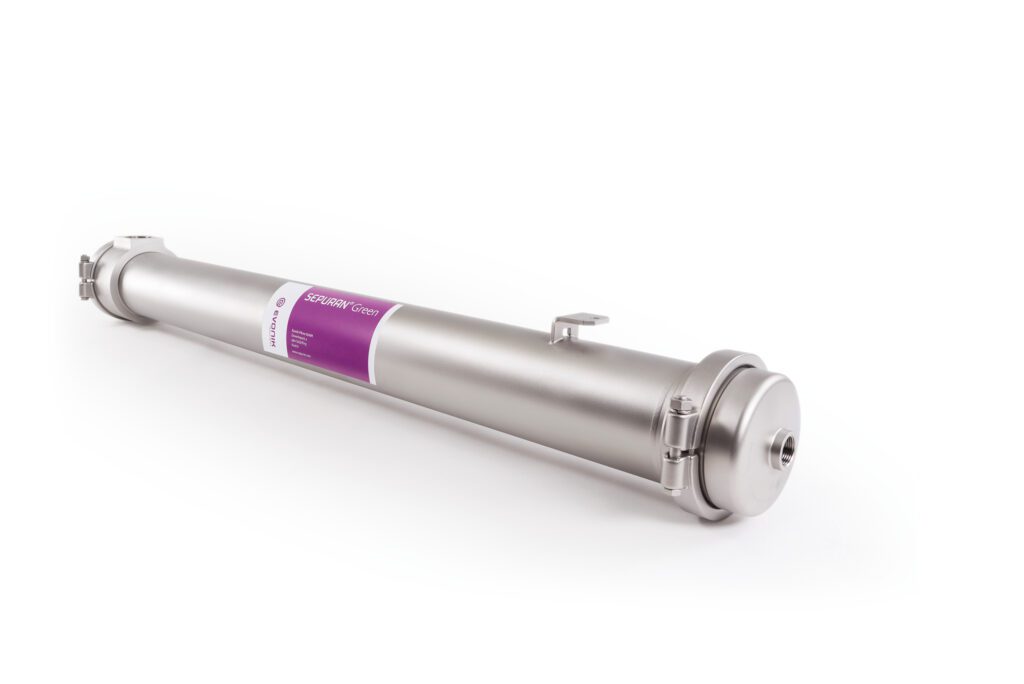Evonik Industries AG (Essen, Germany) has started up a new hollow-fiber spinning plant for the production of gas separation membranes in Schörfling am Attersee in Austria. The new production capacity enables the company to meet the ongoing strong demand for SEPURAN membranes in biogas, nitrogen, hydrogen and natural gas applications. Evonik invested a low double-digit million-euro amount in the new plant and created around 30 new jobs in Schörfling.
Lauren Kjeldsen, head of the Smart Materials Division, says: “The growth path of the membranes business clearly follows the group’s new sustainability strategy.” Last May, Evonik announced plans to invest €3 billion by 2030 in Next Generation Solutions, products with superior sustainability benefits. The company’s goal is to increase sales of Next Generation Solutions from the current 37% to more than 50% by 2030. The rapid increase in demand for Next Generation Solutions offers above-average growth potential for Evonik. “With our innovations, we support our customers in making their own products more sustainable and improving their own climate footprint. Our membrane technology for efficient gas separation is a living example of how Next Generation Solutions from Evonik contribute to sustainable added value in close cooperation with all market players,” says Kjeldsen.
In the new production plant, a high-performance polymer is processed into fine hollow-fibers in several process steps. They are at the heart of Evonik’s SEPURAN membrane technology. The specialty chemicals company draws on its many years of expertise in polymer chemistry and adjusts key membrane properties already at the development stage of the base material — a high-performance polymer — to produce particularly selective and robust membranes that can withstand extreme pressures and temperatures.
“The global gas market has confidence in our membrane technology. With the capacity expansion in Schörfling, we are sending an important signal to our customers and partners of Evonik’s commitment to helping them accelerate the energy transition towards a sustainable gas economy. We believe the energy mix of the future will be biogas, green hydrogen, and further synthesis products. That’s why we are already working to expand our product portfolio and production capacities for this transformational market growth” says Dr. Goetz Baumgarten, head of the Membranes Innovation Growth Field at Evonik.
Evonik already relies entirely on renewable energies for membrane production in Schörfling am Attersee. Green electricity from wind, water, and biomass has been a key energy source for the production facility for years. Since the beginning of 2022, the specialty chemicals company has also been meeting 100% of its gas requirements with biomethane from regional production. By switching to an environmentally friendly energy supply, Evonik is reducing its direct annual CO2 emissions in Austria by around 4,000 metric tons.
Evonik bundles its membrane activities into one of its six innovation growth fields. Within a decade, the company has become a global technology leader for gas separation membranes. SEPURAN hollow-fiber membranes are extremely efficient for separating gases such as methane (CH4), nitrogen (N2), and hydrogen (H2) from gas mixtures. The advantages of Evonik’s membrane technology include a more precise separation of the gases and higher productivity. SEPURAN N2 membranes for efficient nitrogen generation are used, for example, for inerting airplane fuel tanks. SEPURAN Noble membranes extract the hydrogen transported through natural gas pipelines from the CH4/H2 gas mixture at specific points at the H2 gas withdrawal points. SEPURAN NG membranes enable efficient processing of natural gas from sources with high CO2 concentration. SEPURAN Green membranes (photo) enable efficient biogas processing from organic and circular sources.

SEPURAN Green Membrane 4 inch for efficient upgrading of biogas to high-purity biomethane (Source: Evonik)